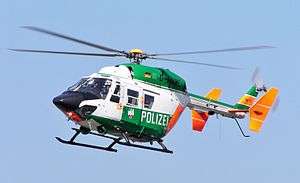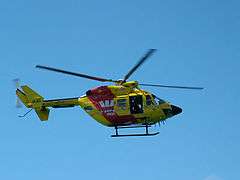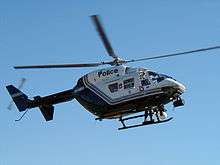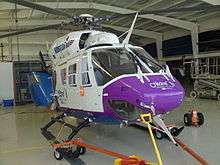MBB/Kawasaki BK 117
| BK117 | |
|---|---|
 | |
| A BK 117 of the German police | |
| Role | Utility/transport |
| National origin | Germany / Japan |
| Manufacturer | Messerschmitt-Bölkow-Blohm (MBB) / Kawasaki Heavy Industries |
| First flight | 13 June 1979 |
| Introduction | 9 December 1982 |
| Status | Production ceased |
| Primary users | DRF ADAC |
| Produced | 1979–2004 |
| Number built | 443 |
| Developed from | MBB Bo 105[1] |
| Developed into | Eurocopter EC 145 |
The MBB/Kawasaki BK117 is a twin-engined medium utility–transport helicopter. It was a joint development between Messerschmitt-Bölkow-Blohm (MBB) of Germany and Kawasaki of Japan. MBB was later purchased by Daimler-Benz and eventually became a part of Eurocopter. The BK117 is popular for passenger and VIP-transport, seating from seven up to 10 people. It is also used for aerial crane and sling work, law enforcement, and military transport, and is exceptional as an air ambulance and search and rescue platform. Its successor, the EC 145, was developed from the BK117 C-1 version.
Development
The BK117 was a joint development between MBB and Kawasaki based on an agreement made on 25 February 1977. The agreement would replace two separate projects for twin-engined general purpose helicopters; the Bo 107 by MBB and the KH-7 from Kawasaki.[2] Costs were shared equally, with MBB developing the rotors (based on the rigid rotor system used on MBB's Bo 105), tailboom, flight controls and hydraulic system and Kawasaki developing the landing gear, airframe, main transmission and other minor components. Each company would have its own assembly line producing aircraft for local markets.[3]
Each company was to build two prototypes (although Kawasaki only built one) to be completed by 1979; one for flight testing and the others for tie down testing and static testing. MBB's flying prototype made its first flight at Ottobrunn on 13 June 1979, followed by the Kawasaki prototype at Gifu on 10 August 1979.[3] Development was slower than expected, a problem made worse by shortages of skilled manpower available at MBB. Although it was originally planned for airworthiness certification to be achieved before the end of 1980, German certification was not achieved until 9 December 1982, with Japanese certification following on 17 December, and the all-important United States FAA certification being obtained on 29 March 1983.[4]
A single BK117 A-3 (c/n 7106) was leased by the Canadian Forces Air Command for a test program and designated as the CH-143. When the program was over, the aircraft was returned to MBB Canada.[5]
In total, 443 BK117s were made; 329 (and two prototypes) by MBB at Donauworth, 111 (and one prototype) by Kawasaki in Japan.
Japanese Production:
BK117 A-1 to C-1: c/n 1001-1112 = 111 + P-3/P-5 prototype
German Production:
BK117 A-1 to B-2: c/n 7001-7275 = 274
BK117 C-1: c/n 7500-7555 = 56
+ P-2 prototype + S-01 Pre-production prototype
NOTE: The last variant of the BK117 was the C-1. The BK117 C-2 is actually the brand name for the EC 145 for the Australasian market, and as such is an EC 145, not a BK117.
Variants

- BK117 P-2 (D-HBKA)
- German prototype, first flown 13 June 1979. Now exhibited at the Bückeburg helicopter museum, Bückeburg, Germany.
- BK117 S-01 (D-HDRF)
- Initial pre-production prototype. Now preserved on top of the DRF-Headquarters at Stuttgart Airport.
- BK117 P-3/P-5 (JQ0003)
- Japanese prototype, first flown 10 August 1979. Now exhibited at Kakamigahara Aerospace Museum, Kakamigahara/Gifu, Japan
- BK117 A-1
- Powered by two Lycoming LTS 101-650B-1 engines. First flown 23 April 1982.
- BK117 A-3
- Introduced in March 1985, the A-3 has a larger tail rotor with improved blades, Yaw CSAS, improved stability (SPAS) and the take-off weight increased to 3,200 kg (7,055 lb).- The Canadian Armed forces leased a single BK 117-A3 for a test program and designated the CH-143. When the program was over, the aircraft was returned to MBB Canada[6]
- BK117 A-4
- Introduced in July 1986, the A-4 has increased transmission limits at take-off power, improved tail rotor head. German aircraft have provision for extra internal fuel, giving enhanced performance.
- BK117 A-3M
- Military version introduced in 1986. The A-3M is fitted with taller skids and can carry 11 troops. A Browning 12.7 mm (0.5 in) machine gun can be mounted under the fuselage in a Lucas turret with 450 rounds and controlled by a helmet-mounted sight. The A-3M also has outrigger pylons which can hold up to eight HOT II or TOW antitank missiles or a variety of air-to-air missiles, rocket-pods, or forward-firing cannons. Provisions for a doorway gunner's position with a 12.7 mm (0.5 in) gun can also be installed.
- BK117 B-1
- Introduced in December 1987, the B-1 is fitted with LTS 101-750B-1 engines to provide increased performance, and a 140 kg (309 lb) increase in payload.
- BK117 B-1C
- UK-certified version with reduced range and endurance.
- BK117 B-2
- Maximum Gross Weight increased to 3,350 kg, 2 x Allied Signal Lycoming LTS101-750B-1 engines fitted as standard, new tail rotor blades, improved "hot and high" performance, take-off/landing limitation increased to 15,000 ft, improved flight performance for: HIGE/HOGE, single engine service ceiling.
- BK117 C-1
- Powered by two Turbomeca Arriel 1E engines. Later models may be upgraded to Arriel 1E2 engines.
- NBK117
- License-built model produced in Indonesia.
- BK117-850D2
- Introduced in 2010, the 850D2 variant is an STC (Supplementary Type Certificate) development (i.e., re-engined) of BK117 B-2 incorporating Honeywell LTS 101-850B-2 engines aimed at improving OEI and Category A performance.[7] Development and certification was conducted in New Zealand by Airwork of Ardmore, NZ, in conjunction with Flight Structures Ltd.[8]
Operators





Civil operators
The majority of the helicopters are operated by various emergency services although it is also operated by private individuals, companies and executive charter operators.
- Everett Aviation[15]

Military and government operators
- Republic of China Coast Guard - BK-117B-2
- Ministry of Emergency Situations - BK-117C-1[29]

Former operators
Specifications (BK117 B-2)
Data from Jane's All The World's Aircraft 1993-94[36]
General characteristics
- Crew: 1
- Capacity: up to 10 passengers
- Length: 9.91 m (32 ft 6 in) (fuselage length)
- Height: 3.85 m (12 ft 8 in) (rotors turning)
- Empty weight: 1,727 kg (3,807 lb)
- Max takeoff weight: 3,350 kg (7,385 lb)
- Fuel capacity: 697 L (183 US Gallons, 153 Imp Gallons) internal fuel
- Powerplant: 2 × Textron Lycoming LTS 101-750B-1 turboshaft, 442 kW (593 hp) each
- Main rotor diameter: 11.00 m (36 ft 1 in)
- Main rotor area: 95.03 m2 (1,022.9 sq ft)
Performance
- Maximum speed: 250 km/h (155 mph; 135 kn) at sea level
- Never exceed speed: 278 km/h (173 mph; 150 kn)
- Range: 541 km (336 mi; 292 nmi)
- Service ceiling: 4,575 m (15,010 ft) (max certified altitude)
- Hover Ceiling: 3,565 m (11,700 ft) (in ground effect)
- Rate of climb: 11.00 m/s (2,165 ft/min)
See also
- Related development
References
Citations
- ↑ "1979: BK 117." Eurocopter, Retrieved: 31 March 2013.
- ↑ Air International April 1989, p. 163.
- 1 2 Air International April 1989, p. 164.
- ↑ Air International April 1989, pp. 164–165.
- ↑ "MBB CH-143 BK 117". Archived from the original on 2006-10-22. Retrieved 2007-03-25.
- 1 2 "BK 117 CH-143". canadianwings.com. Retrieved 2 February 2013.
- ↑ "Honeywell Announces LTS101-850B-2 Engine Upgrade for Eurocopter BK117." Honeywell, 22 February 2009.
- ↑ "Airwork (NZ)’s BK117-850D2 takes to the skies over Australia and New Zealand." Flight Structures Ltd, 1 May 2010.
- ↑ "Careflight: Our Helicopters". careflight.org. Retrieved 2015-06-29.
- ↑ "lifesaver Fleet". lifesaver.org.au. Retrieved 2 February 2013.
- ↑ "STARS fleet". stars.ca. Retrieved 2 February 2013.
- ↑ "ADAC Air Rescue confirms the choice of Eurocopter to renew its helicopter fleet with the EC145 T2 and EC135". eurocopter.com. Retrieved 2 February 2013.
- ↑ "BK-117C". Demand media. Retrieved 2 February 2013.
- ↑ "DRF Luftrettung BK 117". Retrieved 2 February 2013.
- ↑ "Everatt's BK 117 C1". everettaviation.com. Retrieved 2 February 2013.
- ↑ "Auckland Rescue Helicopter Trust (fleet)". rescuehelicopter.org.nz. Retrieved 7 March 2015.
- ↑ "Otago Rescue Helicopter Trust (fleet)". otagorescue.co.nz. Retrieved 2 July 2013.
- ↑ "Daily Air Operations" (PDF). dailyair.com.tw. Retrieved 2 February 2013.
- ↑ "airmethods fleet". airmethods.com. Retrieved 2 February 2013.
- ↑ "KidsFlight 1". stlouischildrens.org. Retrieved 2 February 2013.
- ↑ "ORMC Aircare 1". Orlando Health. Retrieved 12 June 2015.
- 1 2 "FireAir 1". fire.nsw.gov.au. Retrieved 5 February 2013.
- ↑ "WA Police Air Wing". stepforward.wa.gov.au. Retrieved 2 February 2013.
- 1 2 3 4 "World Air Forces 2013" (PDF). Flightglobal Insight. 2013. Retrieved 2 February 2013.
- ↑ "(MBB BK 117) Carabineros de Chile". Retrieved 2 February 2013.
- ↑ "Kawasaki BK-117B-1". Demand media. Retrieved 2 February 2013.
- ↑ "Einsatzfahrzeug: D-HNWQ (c/n: 7554)". © Ebner Verlag GmbH & Co. KG. Retrieved 2 February 2013.
- ↑ "Base Aérea Lima-Callao Policia Nacional del Peru". cavok-aviation. Retrieved 2 February 2013.
- ↑ Mlandenov Air International December 2016, pp. 85–86.
- ↑ "Spanish Guardia Civil". aeroflight.co.uk. Retrieved 2 February 2013.
- ↑ "South African Police Service signs for its 7th Eurocopter AS 350 B3 at AAD 2004". Eurocopter. Retrieved 2 February 2013.
- ↑ "World Air Forces 1991 pg. 37". flightglobal.com. Retrieved 6 March 2015.
- ↑ "World Air Forces 1991 pg. 41". flightglobal.com. Retrieved 6 March 2015.
- ↑ "World Air Forces 1991 pg. 65". flightglobal.com. Retrieved 6 March 2015.
- ↑ "World Air Forces 1991 pg. 71". flightglobal.com. Retrieved 6 March 2015.
- ↑ Lambert 1993, pp. 159–160.
Bibliography
- "BK 117...a Terrestrial Space Ship". Air International, Vol 36 No 4, April 1989. Bromley, UK:Fine Scroll. ISSN 0306-5634. pp. 163–170.
- Hatch, Paul. "World's Air Forces". Flight International, 5–11 December 1990, pp. 35–81.
- Hoyle, Craig. "World Air Forces Directory". Flight International, Vol. 182, No. 5370, 11–17 December 2012. pp. 40–64. ISSN 0015-3710.
- Lambert, Mark. Jane's All The World's Aircraft 1993-94. Coulsdon, UK:Jane's Data Division, 1993. ISBN 0-7106-1066-1.
- Mlandenov, Alexander. "Russia's Responders". Air International, Vol. 91, No. 6, December 2016. pp. 78–87. ISSN 0306-5634.
- Prétat, Samuel, EC 145 & UH-72 published by Éditions Minimonde76 Book on the EC 145 helicopter family ISBN 9 782954 181813 {En}{Fr}
External links
| Wikimedia Commons has media related to MBB/Kawasaki BK 117. |